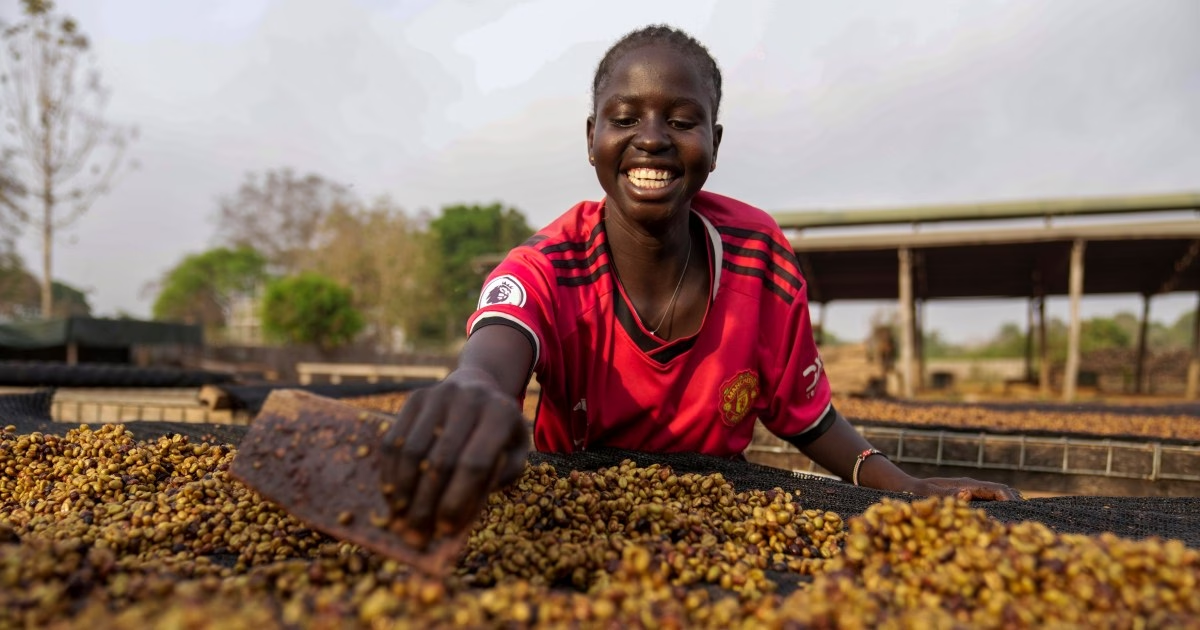Catherine Bashiama gently traces her fingers along the coffee tree she has lovingly cared for since it was a little seedling, three years ago. Her anxious anticipation reaches its peak as she discovers its first fruit buds – she can’t help but beam with pride.
Once unfamiliar with coffee cultivation in her village in western South Sudan, Bashiama now clings to hope that a hardy, climate-resistant variety might be the key to lifting her family out of poverty.
“I dream of sending my children to school, so they can grow up to be the leaders of tomorrow,” shares Bashiama, a loving mother to twelve.
Encouragement comes from the unexpected source of Excelsa coffee, a variety that was discovered over a century ago in South Sudan and has been drawing attention from both locals and the international community. Amid a global coffee crisis, primarily caused by climate change, the search for resilient solutions is more pressing than ever.
According to estimates, Brazil, the world’s leading coffee producer, could witness a 12 percent decline in this year’s harvest because of drought.
“History teaches us,” says Aaron Davis, head of coffee research at the Royal Botanic Gardens, Kew, in London, “that sometimes the world doesn’t give you a choice. Right now, many coffee farmers are bearing the brunt of climate change.”
This is where Excelsa could play a crucial role in climate adaptation.
Predominantly found in South Sudan along with a few other African nations like the Central African Republic and Uganda, and also cultivated in India, Indonesia, and Vietnam, Excelsa is uniquely equipped to endure extreme conditions such as drought and heat, where other coffee varieties would falter. It also offers resilience against many common coffee pests and diseases.
Despite these advantages, Excelsa represents less than 1 percent of the global coffee market, trailing behind the much more popular arabica and robusta. Experts believe that for Excelsa to effectively address the climate-induced gap in the market, it must demonstrate its viability on a larger scale.
For now, however, it holds the promise of a better life for the local population.
Motivated by her husband’s injury, which left them struggling to cultivate enough maize and groundnuts, Bashiama found solace in planting coffee. Since then, the challenge of affording her children’s school fees and maintaining an adequate supply of food has weighed heavily on her.
Another farmer, Taban John, who is 37, envisions using his coffee earnings to purchase a bicycle, which would facilitate the sale of his other crops, including groundnuts and cassava, in town. He also aspires to secure school uniforms for his children.
Community leaders see Excelsa coffee as a beacon of hope for financial independence, noting how communities too often depend on government or foreign aid, which isn’t always reliable, to provide for their families.
Yet, for coffee to truly flourish in South Sudan, a long-term perspective and a stable environment are required.
Elia Box’s experience echoes this sentiment. Half of his coffee crop was lost to a fire in early February. Despite planning to replant, the incident, coupled with the lack of law and order, has left him discouraged.
“With the ongoing conflict,” Elia explains, “there is a lack of long-term thinking when it comes to crops such as coffee. Coffee demands peace.”
Once unfamiliar with coffee cultivation in her village in western South Sudan, Bashiama now clings to hope that a hardy, climate-resistant variety might be the key to lifting her family out of poverty.
“I dream of sending my children to school, so they can grow up to be the leaders of tomorrow,” shares Bashiama, a loving mother to twelve.
Encouragement comes from the unexpected source of Excelsa coffee, a variety that was discovered over a century ago in South Sudan and has been drawing attention from both locals and the international community. Amid a global coffee crisis, primarily caused by climate change, the search for resilient solutions is more pressing than ever.
According to estimates, Brazil, the world’s leading coffee producer, could witness a 12 percent decline in this year’s harvest because of drought.
“History teaches us,” says Aaron Davis, head of coffee research at the Royal Botanic Gardens, Kew, in London, “that sometimes the world doesn’t give you a choice. Right now, many coffee farmers are bearing the brunt of climate change.”
This is where Excelsa could play a crucial role in climate adaptation.
Predominantly found in South Sudan along with a few other African nations like the Central African Republic and Uganda, and also cultivated in India, Indonesia, and Vietnam, Excelsa is uniquely equipped to endure extreme conditions such as drought and heat, where other coffee varieties would falter. It also offers resilience against many common coffee pests and diseases.
Despite these advantages, Excelsa represents less than 1 percent of the global coffee market, trailing behind the much more popular arabica and robusta. Experts believe that for Excelsa to effectively address the climate-induced gap in the market, it must demonstrate its viability on a larger scale.
For now, however, it holds the promise of a better life for the local population.
Motivated by her husband’s injury, which left them struggling to cultivate enough maize and groundnuts, Bashiama found solace in planting coffee. Since then, the challenge of affording her children’s school fees and maintaining an adequate supply of food has weighed heavily on her.
Another farmer, Taban John, who is 37, envisions using his coffee earnings to purchase a bicycle, which would facilitate the sale of his other crops, including groundnuts and cassava, in town. He also aspires to secure school uniforms for his children.
Community leaders see Excelsa coffee as a beacon of hope for financial independence, noting how communities too often depend on government or foreign aid, which isn’t always reliable, to provide for their families.
Yet, for coffee to truly flourish in South Sudan, a long-term perspective and a stable environment are required.
Elia Box’s experience echoes this sentiment. Half of his coffee crop was lost to a fire in early February. Despite planning to replant, the incident, coupled with the lack of law and order, has left him discouraged.
“With the ongoing conflict,” Elia explains, “there is a lack of long-term thinking when it comes to crops such as coffee. Coffee demands peace.”







